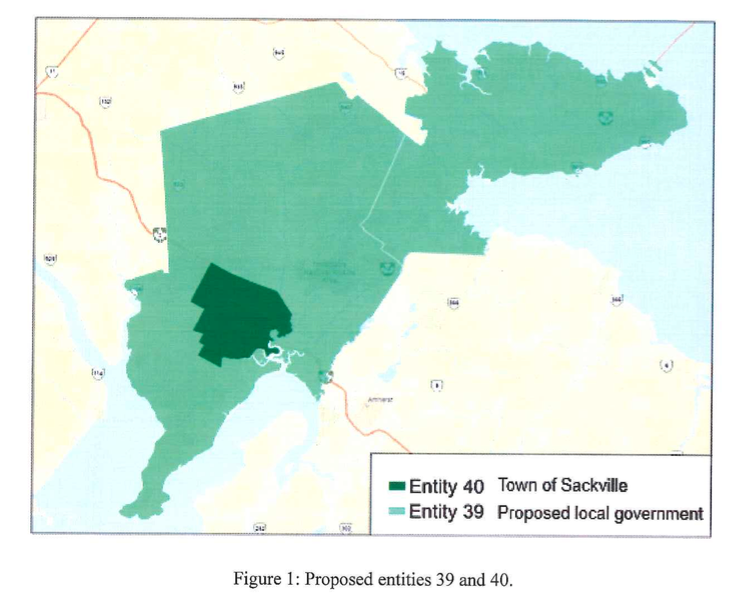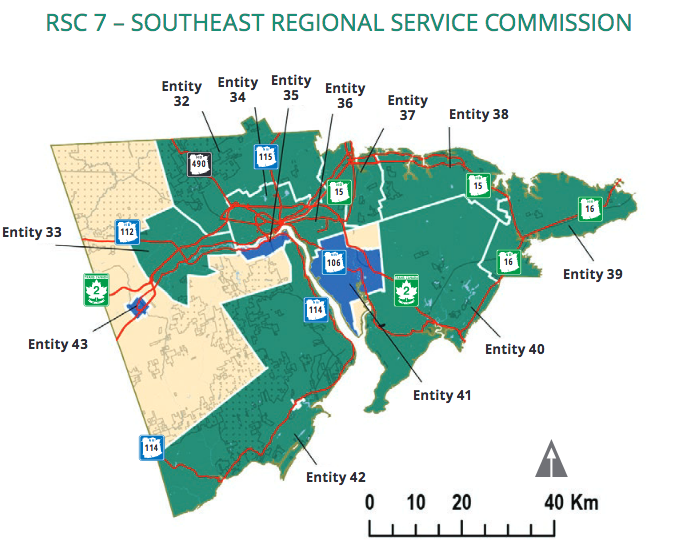Tune in to Tantramar Report on Friday to hear interviews with Sackville Mayor Shawn Mesheau and Dorchester Mayor Debbie Wiggins-Colwell, as well as Memramcook-Tantramar MLA Megan Mitton speaking in the legislature about municipal reform in the Tantramar region.
After a last minute and closed meeting of council on Wednesday afternoon, the town of Sackville has proposed an alternative to Minister Daniel Allain’s plan for redrawing municipal boundaries in the Tantramar Region. In a letter approved by council, Mayor Shawn Mesheau recommends leaving the current town of Sackville boundary as-is, and suggests instead the amalgamation of the villages of Dorchester and Port Elgin, along with surrounding local service districts, to become a large municipality that would completely surround the town, and stretch from Dorchester Cape to Cape Tormentine.
“We have diligently evaluated alternative boundary locations for Sackville but cannot identify a geographical representation that would meet the criteria established in the Finn Report,” says the letter, referring to criteria from the 2008 report that calls for a minimum of 4,000 people or $200 million in tax base to justify a unique municipality.
The town of Sackville fits both requirements, with a tax base of over $660 million and a population of just over 5300. The suggested new amalgamated municipality would also meet both criteria, with a tax base of roughly $424 million and a population of about 4800. Under Sackville’s suggested plan, the pain of amalgamation would be borne solely by the existing villages of Dorchester and Port Elgin, leaving Sackville unscathed. There would also be a wealth gap delineated between the existing town and the suggested new amalgamated entity, with the town’s per capita tax base being about 1.4 times that of the surrounding municipality.
It’s not clear what options were discussed in council’s closed meeting on Wednesday, but on Monday some councillors indicated that the possible amalgamation of Sackville with the local service district surrounding the town would be considered reasonable. Almost all councillors have opposed the current plan, save for councillor Matt Estabrooks, who told council back on December 6 that he found the province’s proposal for Entity 40 to make sense “logistically, geographically and financially” in the long term. “Our larger community already encompasses all of the areas identified in Entity 40,” said Estabrooks. “Entity 40 is who we are and it captures everyone who currently resides and uses the services the Town of Sackville provides.”
The rest of council and senior staff disagreed, citing key concerns with the consultation process and the lack of warning that forced amalgamations were on the table. The letter council approved on December 6, 2021 also raised a number of concerns about taxation, and the challenges of consolidating three fire departments, two water distribution systems, and two separate policing contracts.
What does Dorchester think?
The village of Dorchester has submitted their own letter to Minister Allain, outlining their opposition to the forced amalgamation proposed by the province’s white paper. Though Dorchester does not suggest an alternative boundary, Mayor Debbie Wiggins-Colwell says the village is open to expanding its boundary to include the Dorchester local service district which surrounds it, as long as the province follows through on its promise to cover the maintenance of roads through the district. But the council would like to see Dorchester remain Dorchester, says Wiggins-Colwell. “We’ve been doing fine in our own little entity. Our finances are good. We’d like to stay the same,” she says. The village’s letter outlines some concerns about the forced almalgamation with Sackville such as “how it’s going to affect local identity, our finances, our staffing, our fire department,” says Wiggins-Colwell. The village council also express concern for the relationship with First Nations. Neighbouring Fort Folly First Nation weren’t consulted at all in the reform process, says Wiggins-Colwell.
The village council has not formally considered Sackville’s larger amalgamation proposal, but it’s unlikely the idea would pass muster, considering it would see Dorchester amalgamated with Port Elgin, a village about 50 kilometres away, into a new entity twice the size of the one originally proposed by the province.
What’s the rush?
The province’s white paper outlining the radical restructuring of the municipal map in New Brunswick was released on November 18, just four weeks ago. The bill passed through the legislature this week does not include the boundary mapping of the new entities, but rather outlines the province’s power to create them. And yet Thursday was chosen as the deadline for municipalities to share feedback on the proposals.
In Sackville, the white paper plan to amalgamate the town with Dorchester and surrounding local service districts came as a complete surprise to staff, mayor and council. The deadline of one month for feedback from municipalities was not announced along with the white paper, though it is now featured on the province’s website. Sackville council did not meet to publicly discuss the plan until its regularly scheduled discussion meeting on December 6, 2021, when it approved a response letter discussed in a closed meeting beforehand.
In addition to limiting the time period for feedback from municipalities, the province also limited the time for debate about the radical reforms in the legislature, to ensure the bill could pass before the legislature breaks for the holidays.
Local Governance department spokesperson Vicky Lutes responded to concerns over the rushed timeline by pointing out that the consultation process for reform started a year ago, and that the department has heard from “dozens of local governments, dozens of LSDs and many residents as well.”
Why is council talking about local governance reform in a closed meeting?
Sackville town council almost did not submit an alternative boundary proposal to the province. In their regular meeting on Monday, Councillor Sabine Dietz brought up the idea of sending in an alternative boundary, but council would need to vote to authorize the Mayor to send in a suggestion.
The immediate response from staff was that time and resources were too tight to come up with a suitable suggestion. Councillors sympathized, but still called for an emergency meeting on Wednesday to hammer out a proposal.
The meeting was deemed to be held in camera, the second closed meeting on the topic. CHMA questioned the justification for the closed session on Monday. CAO Jamie Burke said the discussion would hit upon some topics deemed suitable for in camera discussions by the Local Governance Act. “We’re going to be talking about things and saying things that are going to impact legal, HR, land… All of those issues allow us to go in camera,” said Burke. “It’s just an opportunity for us as a group to go in to the meeting informally, and kind of hash this out,” he said.
The Local Governance Act makes no allowance for informal discussions, and requires that all regular and special meetings of council and committees of council be held in public, with the exception of those covering certain sensitive topics, listed in the Act:
Closed meetings
68(1) A council meeting or a committee of council meeting may be closed to the public for the duration of the discussion if it is necessary to discuss
(a) information of which the confidentiality is protected by law,
(b) personal information as defined in the Right to Information and Protection of Privacy Act,
(c) information that could cause financial loss or gain to a person or the local government or could jeopardize negotiations leading to an agreement or contract,
(d) the proposed or pending acquisition or disposition of land,
(e) information that could violate the confidentiality of information obtained from the Government of Canada or from the government of a province or territory,
(f) information concerning legal opinions or advice provided to the local government by its solicitor or privileged communications between solicitor and client in a matter of local government business,
(g) litigation or potential litigation affecting the local government or any corporation referred to in subsection 8(1), the local government’s agencies, boards or commissions including a matter before an administrative tribunal,
(h) the access to or security of buildings and other structures occupied or used by the local government or access to or security of systems of the local government, including computer or communication systems,
(i) information gathered by the police, including the Royal Canadian Mounted Police, in the course of investigating any illegal activity or suspected illegal activity, or the source of that information,
(j) labour and employment matters, including the negotiation of collective agreements.


